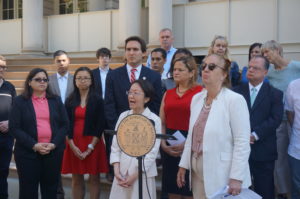
Manhattan Borough President Brewer, Public Advocate James, and Council Members Chin and Kallos speaking on the initiative outside of City Hall. Image credit: Manhattan Borough President Gale Brewer
Initiatives proposed in the wake of the Rivington House sale would prompt public review process and transparency. On July 19, 2016, Manhattan Borough President Gale Brewer and Council Member Margaret Chin wrote a letter to the City Planning Commission in favor of subjecting any changes made to deed restrictions throughout New York City to the Uniform Land Use Review Procedure. The letter is the latest development in a series of events sparked by the sale of the Rivington House, a nonprofit nursing home on Manhattan’s Lower East Side, to luxury condominium developers. For CityLand’s previous coverage on the City’s involvement in the Rivington House’s sale, click here.
The Rivington House was a non-profit nursing home, formerly owned by the City and sold to VillageCare encumbered by a two-part property restriction ensuring its usage in perpetuity as a nonprofit nursing home. VillageCare sold the Rivington House to the Allure Group in 2015, and the Allure Group—in following typical deed-modification procedure—paid the City a nominal $16 million to have the two-part restriction lifted in November 2015. Three months later, the Allure Group sold the Rivington House to luxury condominium developers for $116 million.
On May 25, 2016, Borough President Brewer and Council Member Chin proposed a new piece of legislation, Intro No. 1182-2016, which sought to reform the City’s deed-modification procedures by creating a publicly available, searchable database containing all properties subject to deed restrictions imposed by or on behalf of the City, and by requiring the provision of additional notice to the public. The legislation was prompted by the fact that the current deed-modification procedure only requires that public notice be provided via one listing in the City Record.
Since proposing their legislation, Borough President Brewer and Council Member Chin have decided that the issues presented by the sale of the Rivington House require greater reformations than they had proposed originally. On July 19th, Borough President Brewer and Council Member Chin wrote a letter to the City Planning Commission, seeking to include under the purview of the ULURP—which the letter described as “the city’s gold standard of public review”—all requests to modify the deeds of formerly City-owned property—including the removal or modification of property restrictions. The letter unequivocally requests that City Planning use its Charter-granted authority to recommend such legislation to the City Council to be enacted into a local law.
“The city already has a process for considering land use questions — it’s called ULURP, and it works,” said Manhattan Borough President Gale Brewer. “We lost Rivington House because the deed restriction change was managed by the wrong agencies in a bad process. The best way to fix this is to handle these land use changes the same tried-and-true way we’ve handled other meaningful land use changes for years, with transparency and public input.”
“Rather than sticking with a broken system that took Rivington House from the community, or creating another system from scratch, it makes sense to utilize a proven process that for decades has guided thousands of land use changes,” said Council Member Margaret S. Chin. “By making deed restriction changes subject to ULURP, we will introduce transparency and public input to an inconsistent process that has failed to protect and preserve significant community assets, such as Rivington House.”
The initiative is supported by other elected officials, including City Council Speaker Melissa Mark-Viverito, Public Advocate Letitia James, and Council Member Ben Kallos.
By: Jessica Soultanian-Braunstein (Jessica is the CityLaw Fellow and a New York Law School Graduate, Class of 2015)


Dear Ms. Jessica Soultanian-Braunstein,
My organization, the City Club of New York (Ross Sandler is a member of its Board) is interested in the deed restriction issue.
I gather that you may have some leads re research concerning the present status of the law on such restrictions as Rivington House. It appears to me that such restrictions are already real property interests covered by Charter Sec. 384. If so, I wonder whether the cancellation would not be beyond the authority of the City, except in compliance with Sec. 384 (i.e. cancelable after the fact).
Any thoughts?
Michael Gruen